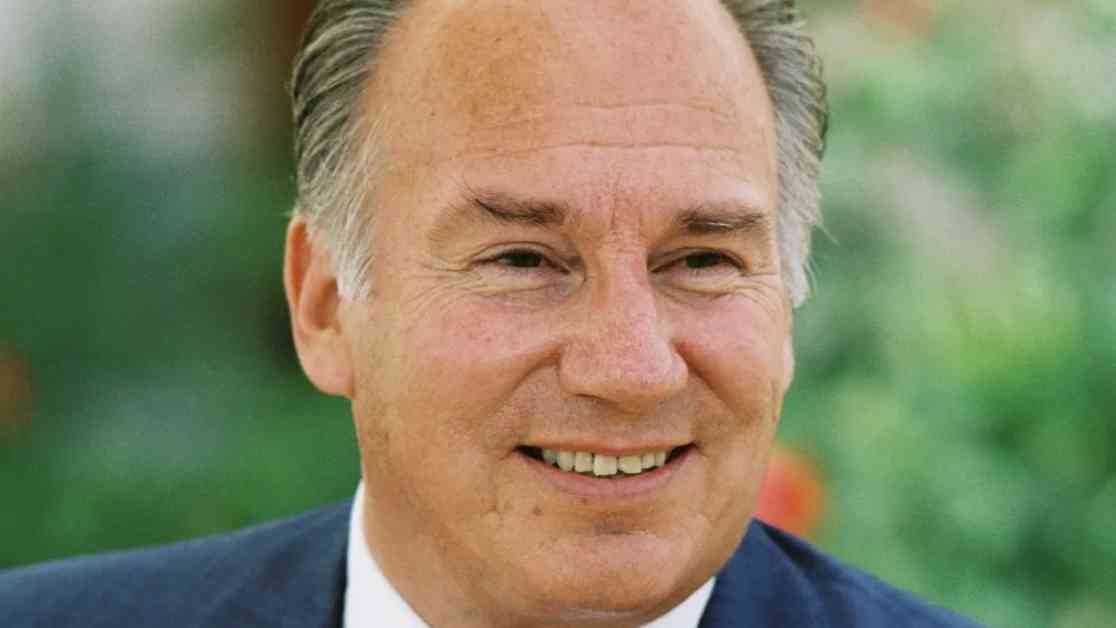The passing of Aga Khan IV, a revered spiritual leader, philanthropist, and one of the world’s wealthiest individuals, at the age of 88 in Lisbon, Portugal, marks a significant moment for the Ismaili community. As the 49th hereditary Imam of the Shia Ismaili Muslims, he led a global following of around 15 million while overseeing an extensive philanthropic and business empire. His successor is poised to be announced posthumously following the reading of his will.
A Life of Wealth, Leadership, and Service
Born as Prince Karim al-Hussaini on 13 December 1936 in Geneva, Switzerland, Aga Khan IV assumed his title in 1957 at the tender age of 20 after the passing of his grandfather, Aga Khan III. This appointment deviated from tradition, bypassing his father, Prince Aly Khan, due to his grandfather’s belief in the need for a young and dynamic leader to navigate the rapidly evolving world.
Directly descended from the Prophet Muhammad through his daughter, Fatima, and son-in-law, Ali, Aga Khan IV never asserted divine status but positioned himself as a mentor for his followers in matters both religious and secular. Apart from his spiritual role, he was renowned for his vast financial wealth, philanthropic endeavors, and a deep-rooted passion for horse racing. Notably, he owned some of the world’s top racehorses and was the breeder of the legendary stallion Shergar, who was infamously abducted in Ireland in 1983 and never recovered.
A Billionaire With a Passion for Philanthropy
Estimates place Aga Khan IV’s fortune at £10.5 billion ($13.3 billion), sourced from family inheritance, diverse business investments, and contributions from his followers who were encouraged to donate a portion of their earnings. Despite his immense wealth, he was unwaveringly committed to philanthropy.
In 1967, he established the Aga Khan Development Network (AKDN), a premier private development agency operating in over 30 countries worldwide. Specializing in healthcare, education, rural development, and cultural preservation, the network has transformed the lives of countless individuals in impoverished regions. Notably, the AKDN’s annual budget for non-profit development activities surpasses £785 million ($1 billion), funding essential institutions like hospitals, universities, and microfinance organizations globally.
A Complex Personal Life
While Aga Khan IV’s public persona was defined by his philanthropy and leadership, his personal life often faced public scrutiny. He was married twice and was a father to four children.
His first marriage to Princess Salimah Aga Khan, formerly known as Sarah Frances Croker Poole, produced three children—Princess Zahra, Prince Rahim, and Prince Hussain—before ending in divorce in 1995. Subsequently, he married Princess Inaara Aga Khan, born Gabriele Renate Thyssen, with whom he had one son, Prince Aly Muhammad. Their marriage concluded in a highly publicized divorce settlement in 2014.
Expected to succeed Aga Khan IV is his eldest son, Prince Rahim, aged 53, as reported by Times Now News.
A Global Legacy and Royal Connections
Throughout his life, Aga Khan IV moved within elite circles, gracing high-profile events alongside world leaders and royalty. He shared a close bond with King Charles III, hosting him at his opulent estate in France. Photographs captured him with Queen Elizabeth II, Prince William, and Kate Middleton at various official gatherings.
Aga Khan IV’s influence was particularly profound in the UK, where he held British citizenship and maintained strong relationships with the government. His contributions to architecture and Islamic culture led to the establishment of the Aga Khan Programme for Islamic Architecture at prestigious institutions like Harvard and MIT. Additionally, the Aga Khan Award for Architecture recognizes excellence in the field, further solidifying his legacy as a bridge between the Islamic world and the West, advocating for tolerance and understanding across diverse cultures.
The Aga Khan’s Love for Horse Racing
Among his various interests, Aga Khan IV was renowned in the world of sports for his unwavering passion for horse racing. His racing and breeding operations, situated in France and Ireland, produced multiple Derby-winning thoroughbreds.
Notably, his most acclaimed horse, Shergar, achieved a record-breaking victory in the Epsom Derby in 1981, winning by an impressive 10 lengths before being tragically stolen by masked individuals two years later. Despite efforts to negotiate the horse’s return with the kidnappers, believed to be affiliated with the IRA, Shergar was never recovered. Nevertheless, Aga Khan IV persisted in his dedication to horse breeding, securing numerous Prix de l’Arc de Triomphe and Epsom Derby victories.
A Final Farewell
The passing of Aga Khan IV has left the Ismaili community in mourning, with tributes pouring in from global political and religious figures. Canadian Prime Minister Justin Trudeau hailed him as an “extraordinarily compassionate global leader,” while the Aga Khan Development Network emphasized his lifelong commitment to enhancing the quality of life for all, regardless of religious background.
His funeral arrangements are set to take place in Lisbon, where he had been residing in recent years. The formal announcement of his successor, expected to be Prince Rahim, will follow the reading of his will.
As Aga Khan IV bids farewell, he leaves behind a legacy not only as a spiritual guide but also as a philanthropic giant, whose charitable contributions will continue to impact countless lives worldwide for generations to come.













